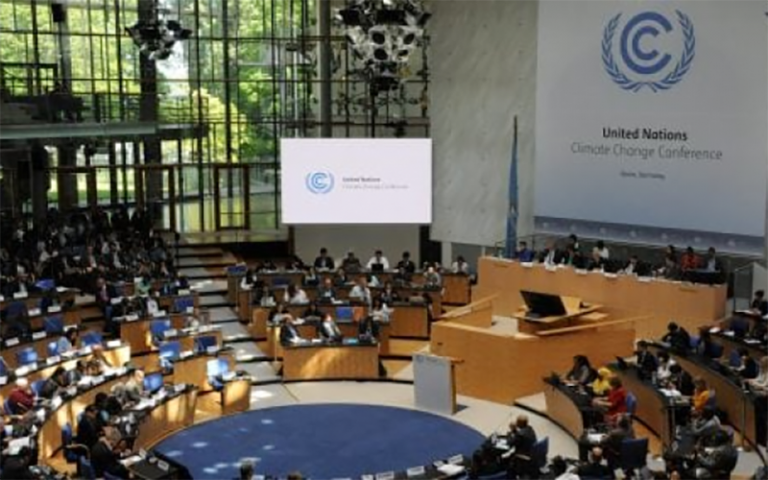UCL at COP27: a guide to everything that happened
15 December 2022
What went down at COP27, who was involved from UCL, and how can we take action to tackle climate change? Take a look at our rundown guide for highlights from the conference and ways to get involved.

The Conference of the Parties to the United National Framework Convention on Climate Change – COP27 for short – is an annual session bringing together heads of state and delegates from around the world to negotiate a response to the global issue of climate change.
This year’s summit was the 27th of its kind – as reflected in its name – and took place in November 2022 in Sharm El-Sheikh, Egypt. UCL was represented at the conference by climate experts from across the institution, with teams of academics also monitoring and providing expert commentary from London.
What went down at the conference?
Week One – the highlights
“One of the highlights of the [conference] was when negotiators agreed to include Loss and Damage in the agenda for the very first time”, says Andrea Paulillo, a Senior Research Fellow who was in attendance at the session. “Loss and Damage is the support from rich nations to low-income countries that have suffered damage from climate change – perhaps the first step to an admission of responsibility”.
Dr Kate Greer, a Research Fellow in the Centre for Climate Change and Sustainability Education, selects the stories she heard of how climate change impacts communities as among the most compelling moments of her week, noting that “whilst these stories are distressing to hear, COP is an important occasion to shine the spotlight on them”.
And Professor Nicola Walshe, Executive Director of the UCL Centre for Climate Change and Sustainability Education (CCCSE) describes attending the Climate Change, Environmental Management and Self-Determination session as a key moment from her time at the conference, calling for climate change education to go further to prioritise climate justice.
See the full highlights and reflections from Week One.
Week Two – the highlights
Simon Chin-Yee, who has participated in the last eight COPs, notes that the second week at COP27 increased in urgency as the closing plenary loomed; “The fact that member states were negotiating the final text until 6am on Sunday morning is telling of how much work needed to be done”.
“From a positive side, this meant that there was a real sense that they wanted to come up with something more substantial on Loss and Damage (L&D) – and they did”
That said, no new targets on emissions were set out, “jeopardising the 1.5°C goal set out in the Paris Climate Change Agreement”. Chin-Yee reflects that, nevertheless, the L&D fund was overall “a win for those who have been fighting for 30 years to get industrialised countries to agree to pay up for the historical emissions that are decimating economies, cultural identities and even whole societies”.
See the full highlights and reflections from Week Two
Who attended COP27?
UCL was represented by over 21 delegates at this year’s COP, with academics and researchers from a whole host of different departments and areas of expertise – including economics of innovation, climate change, social inequalities, child health, decarbonisation of shipping, racism and more.
Meet the full team – as well as the UCL students also in attendance – on our dedicated webpage.
How is UCL shaping the COP debate?
From publishing a handbook for communicating on climate change to creating a carbon footprint calculator, UCL staff and researchers have played a key role in discussions about the climate crisis. Read on for:
- Comment and analysis on COP27 from UCL's climate experts;
- How UCL is taking and inspiring action on climate change;
- Case studies on UCL people collaborating with policymakers, entrepreneurs and local citizens to tackle the climate emergency;
- UCL’s Generation One climate podcast series;
- How UCL is supporting the UN Sustainable Development Goals;
- A short history of the successes and failures of the international climate change negotiations.
You can discover UCL’s full suite of climate change-related work – including a landmark Arctic research expedition, a world-first in sustainable tax system development, and collaborations with the Met Office – by visiting our dedicated research webpage.
Get involved!
Generation One
UCL's climate action campaign, Generation One, aims to mobilise as many people as possible to start making small changes to help our planet. To date, we’ve had a total of 2,184 pledges on actions that range from cycling a journey to providing food for bumble bees. The campaign webpage includes ideas on getting involved, information on the science behind the pledges, and some helpful tips.
We can change what’s possible tomorrow by making a change today – head over to the Generation One website to pledge your action and help create a more positive, fair and progressive future for all.
The 1.5˚C Charter
Scientists from UCL, the University of Exeter and the International Centre for Climate Change and Development (ICCCAD) have launched a charter to highlight how breaching the 1.5˚C target will cost far more than the cost of reaching it.
The charter calls on governments to consider the human and economic cost of climate change when tackling global heating – get involved by signing your name.
Image credit: Sustainable UCL
 Close
Close

